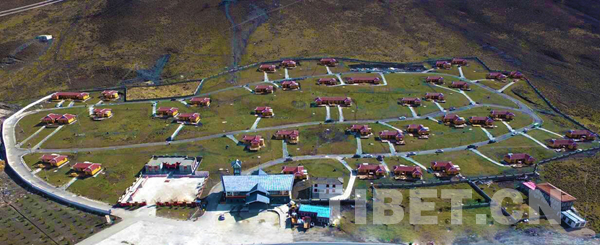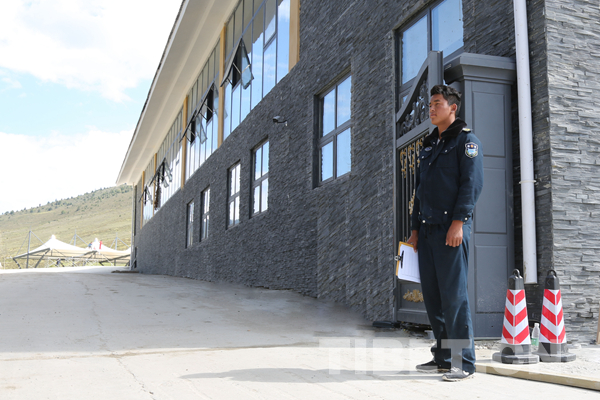A tapestry of achievement: safe water leading to prosperity (I)
Editor's note: The Sichuan-Tibet Plateau, a beautiful region that reaches toward the heavens, is a place showered with blue skies, covered in white clouds, and dotted with snow-covered mountains, but recently, something truly remarkable has been materializing among the households that call this place home. A groundbreaking historic change has been reshaping the land and its people. From today on, we will publish a series of stories to tell you those changes.
"We did it! We finally have safe water!" are the cheers heard by herders, farmers, and other residents from and around Zoige County within the Aba Tibetan and Qiang Autonomous Prefecture. Prayer papers are being thrown, and sutra banners are being hung. This is truly a cause for celebration!
On July 10th, 2015, the local monastery town of Taktra welcomed workers to complete a water-supply project sponsored by Deyang City. With a total investment of 12 million yuan, the project solved major problems with the water supply that had been the perpetual bane of existence for over 10,000 local residents and 3,500 nearby herders and farmers, and now, the dream of so many over several generations has finally become a reality.
A Long-Time Burden
Zoige County is situated at 3,406 meters (11,174.5 feet) above sea level. It is well known as "the most beautiful wet grassland on top of the Chinese highlands" as well as the "hometown of China's black-necked cranes". Part of the upper reaches of the Yellow River can be found there, and it has also been called the "oasis of the northwestern plateau" and a "paradise at the edge of the clouds". In 2005, the local prairie was cited as "the most charming wetland in China" by National Geographic Magazine. How, then, could safe water ever be lacking in a place such as this?
"Zoige sits upon the edge of the sky, but getting good water is like an attempt to seize the heavens!" These are some of the lyrics of a local tune passed down from generation to generation. It seems that locals have always wanted access to sanitary water.
"To tell the truth, the grassland here is really 'dry', meaning it has no useful water," says Tashi, a 68-year-old Tibetan man, who seems to have a sour taste in his mouth at the thought. Water is actually pretty much everywhere, but good drinking water is nowhere to be found. Minerals and bacteria are quite pervasive, and the minerals alone are much higher in concentration than considered safe for consumption. The only way they could drink water in the past was to carry it home from far-away locations.
Ten years ago, the entire area was supplied with tap water, but the water came from a severely limited source, the Black River. Mud and sand were commonly found in it and winter and nearby tourism made water so scarce that locals could not even use it to fulfill their basic needs.
Deyang City was appointed to support Zoige County in July of 2012, and not long after that, the city began the process of building an improved society by first starting with the establishment of a sanitary water supply system. Experts were invited in to conduct a number of investigations and were asked to map out what needed to be done. Both the Deyang and Zoige governments were under constant stress, but in the end, the new water supply system began formal operation on July 10th of 2015.
The Chinese version of this story is written by Luo Xiaomin and translated into English by Huang Wenjuan. And the story is sourced from the United Front Work Deparment of the Communist Party of China (CPC)Sichuan Provincial Committee.
Editor: Ana Wu
Your Comment
Name E-mailRelated News
-
;
-
-
-
Eda Menpa's major shift (II): From Herders to Shareholders
To be better off as a society, locals had to look for a hand up to get out of their critical situation and eventually adopted initiatives presented through targeted poverty-relief projects.
-
-
-

-
A tapestry of achievement: Eda Menpa's major shift (I)
From a poor village to a tourist hub and from being impoverished to becoming shareholders, how is it that Eda Menpa and its people have attained such great success?
-
Based in Lhasa, Tibet Vista is a Tibet travel agency that specialized in Tibet permit, and Tibet tours for both private and group travelers at a local price!
•4 Days Lhasa City Group Tour from USD 460 •8 Days Everest Base Camp Group Tour from USD 850 •15 Days Mt.Kailash Group Tour from USD 1780 •2016 Tibet Train Tours from Beijing, Shanghai, Chengdu, Xining,etc











